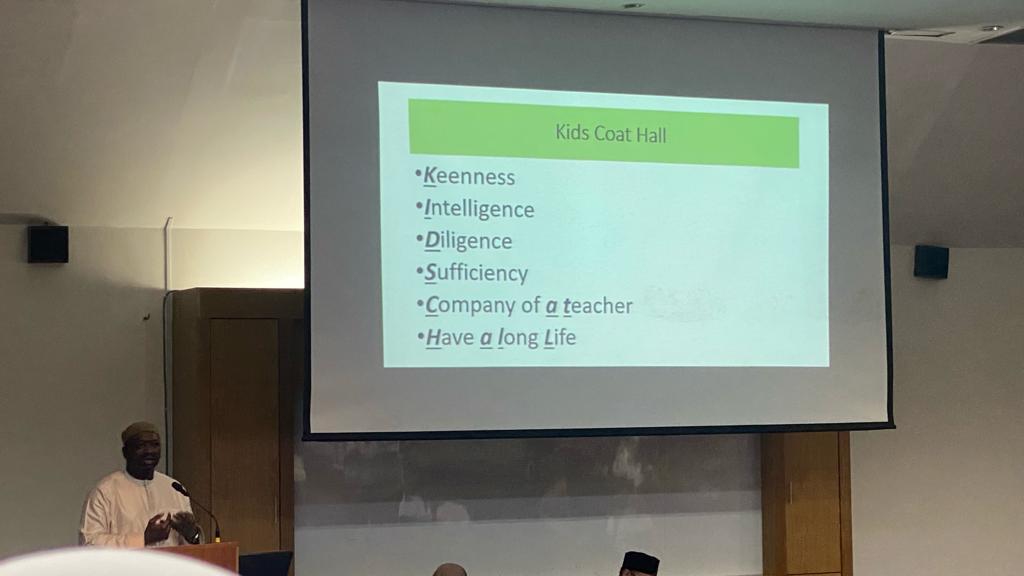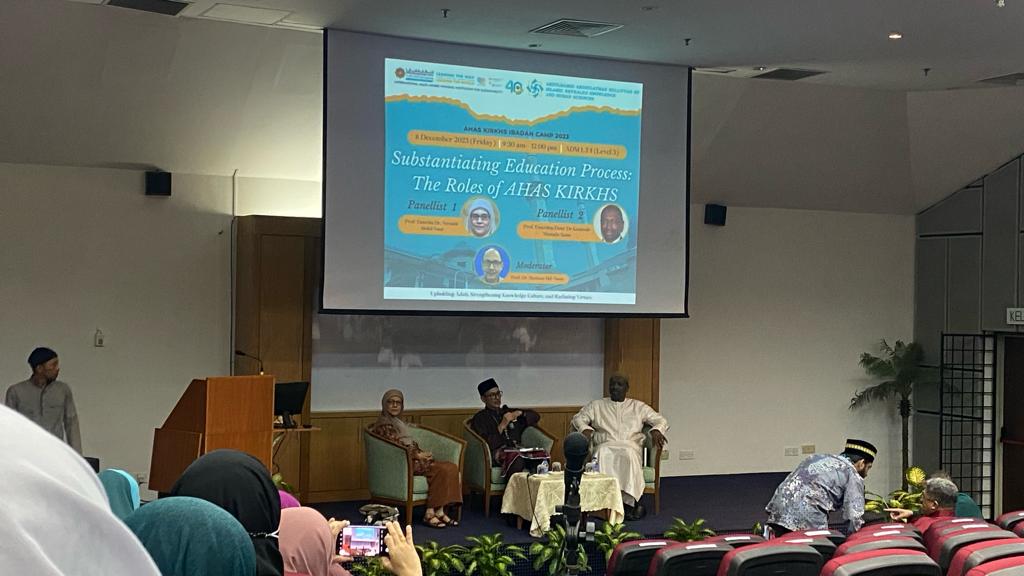By Aida Mokhtar
The first session of the AHAS KIRKHS Ibadah Camp commenced on a powerful note as it encompassed two distinguished panellists who were recently conferred the honorary titles of Professor Emeritus and Professor Emerita at the 39th IIUM Convocation Ceremony. The session took place on Friday, 8 December 2023 at IIUM Gombak. It was moderated by an academic of the Department of Sociology and Anthropology, Prof. Dr. Hazizan Md. Noon.
The two panellists were Secretary General, International Fiqh Academy, Organisation of Islamic Cooperation (OIC), Prof. Emeritus Dato Dr. Koutub Moustafa Sano and Psychology academic at Ibnu Haldun Universiti, Turkiye, Prof. Emerita Dr. Noraini Mohd Noor.
Their presentations were based on the broader topic, “Substantiating the Education Process: The Roles of AHAS KIRKHS”. Prof. Emerita Dr. Noraini Mohd Noor began the session by presenting on a topic from the perspective of Psychology, entitled, œPsychology, Modern Science, and Education. What was core to her rendition was to understand ˜man from both the Western and Islamic perspectives. She mentioned that œThe ˜who of man is central to the kind of education we want.
It is clear that there is the need to reflect upon the differences of these perspectives as Western education has indoctrinated the students of the Western perspective of knowledge which academics of the IIUM need to scrutinise and teach their students content that is more apt for the Islamic worldview.
For one, the Western perspective of the epistemology of knowledge is more focused only on what is observed in this world whilst the Islamic perspective is focused on both the sensory and metaphysical marking the notion underscored by Prof. Emerita as, œEpistemology in the service of ontology. The West is concentrated on life on earth whilst, Islam puts into perspective the Hereafter hence, the sense of accountability is felt of our actions on earth.
The Islamic worldview differs our understanding from the West of even how wisdom is derived from knowledge, said Prof. Emerita Dr. Noraini. Wisdom in the West is derived from data whereas from the Islamic perspective, wisdom is from God. She also articulated that man is composed differently from the views of both perspectives as the notions of form and meaning from the Islamic tradition through œMatter (jism and nafs/soul) and ruh/spirit (pneuma) is felt as opposed to man is made of matter only (soma and psyche) as highlighted by the Western perspective. Such differences in worldviews dictate our various understandings of man and the epistemology of knowledge marking the need for further reflection and imbuement of knowledge with the Islamic perspective.
On the other hand, Prof. Emeritus Dato Dr. Koutub Moustafa Sano proceeded to present on, œThe Six Principles of Learning according to Imam Shafi. He described Imam Shafi as a great person who was more knowledgeable than his teacher, Imam Malik. Imam Shafi was not only the disciple of Imam Malik for nine years but he also learned from other scholars as well in Makkah, Madinah, Kufa, Basrah, Yemen, Syria and Egypt. According to muslimscholars.info and Islamicfinder.org, some of the scholars who taught Imam Al-Shafi were: Muslim bin Khalid Al-Zangi, Sufyaan bin Uyainah Al-Hilaali, Ibrahim bin Yahya, Wakee bin Al-Jarraah bin Maleeh Al-Kofi, Muhammad bin Hasan Al-Shaibaani, Hammaad bin Usama Al-Haashimi Al-Kofi, and Abdul-Wahhab bin Abdul-Majeed al-Busri.
Imam Shafi memorised the Quran and Imam Maliks “Al Muwatta”, a compendium of Hadith and Fiqh knowledge. As Imam Shafi was a serious and successful student, Prof. shared with the audiences, the six principles of learning which according to Imam Shafi were: Having a long time (a student must put in the time needed to learn and have blessed time), intelligence (the ability to learn), keenness (having the desire to learn), diligence (putting in consistent effort to learn), sufficiency (sustenance or having the means to invest in books, classes, and other relevant tools to acquire knowledge), and company of a teacher (having a guide who is an expert in the field to help the student) which he put in the form of the acronym Kids Coat Hall.
The event ended with much reflection upon what constitutes Islamic knowledge and how to acquire such knowledge so as to continuously be blessed by Allah SWT. As the Murabbi of AHAS KIRKHS, the biggest Kulliyyah in the IIUM, we play a big role in ˜leading the way in achieving the seven missions of the IIUM that are imbued with developing, disseminating the Islamisation of knowledge and producing Islamic scholars.***
Photos:

- UTCC and IIUM Sign Historic MoU Fostering Closer Relations - August 8, 2025
- Happy Mother’s Day from IIUMToday - May 12, 2025
- IIUM Rector Launches ‘Support our Special Podcast’ in Special Eid Celebration - April 24, 2025
